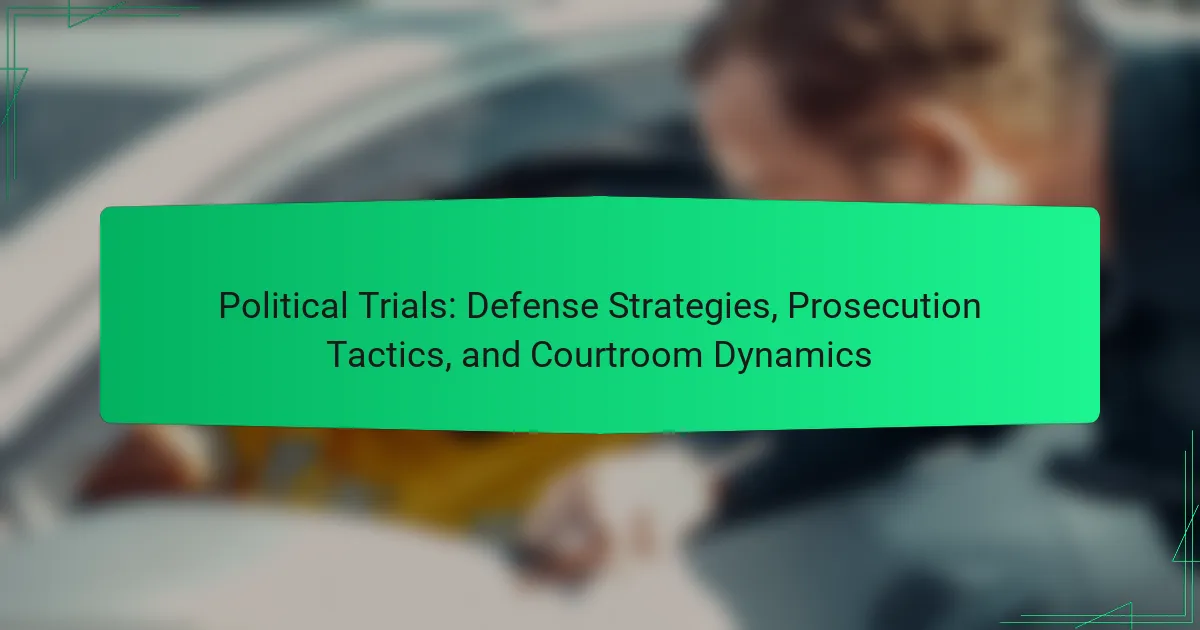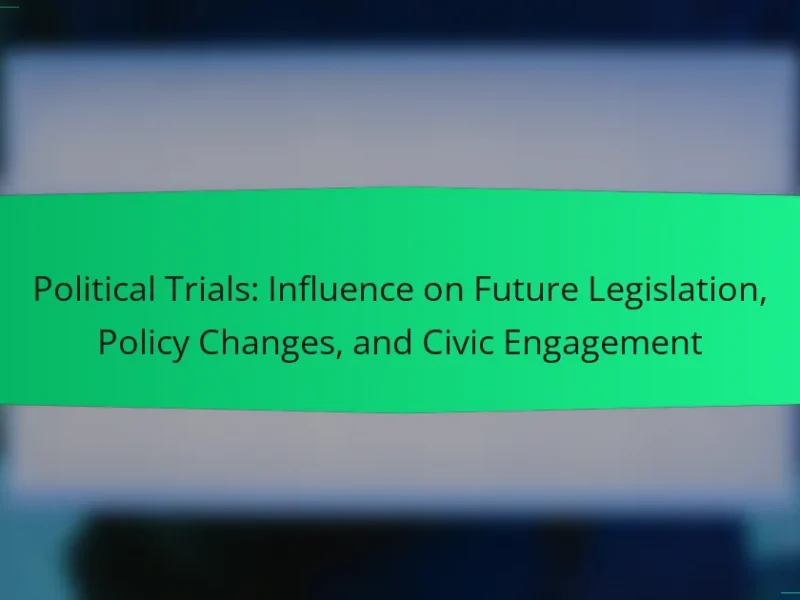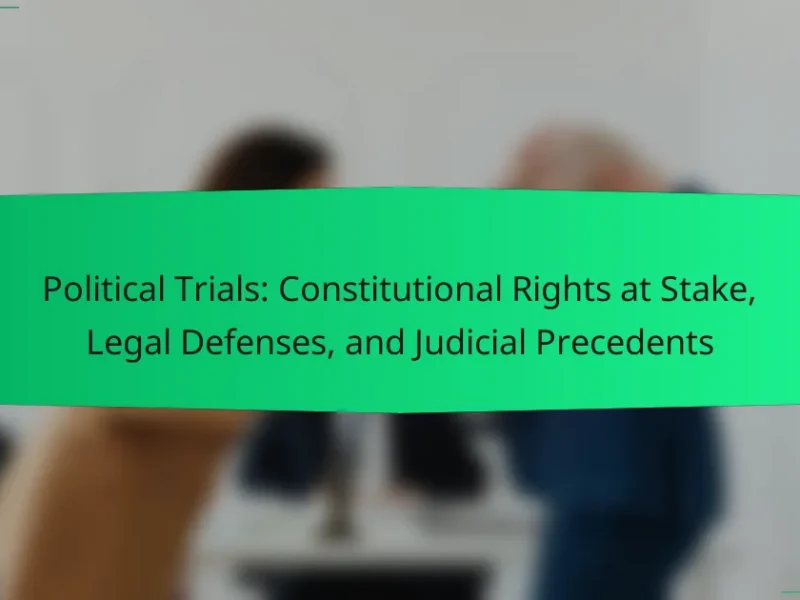Political trials are legal proceedings where defendants face charges primarily motivated by political reasons, often occurring in contexts where the state seeks to suppress dissent or control opposition. These trials are characterized by a lack of impartiality in the judicial process, with outcomes frequently influenced by political agendas rather than legal merits. The article examines defense strategies, such as presenting alibis and challenging evidence, alongside prosecution tactics, including strategic evidence presentation and public opinion manipulation. Additionally, it explores the dynamics of the courtroom, highlighting the polarized atmosphere and the pressures faced by judges and juries in politically charged environments. Overall, the discussion provides insights into the complex interplay of legal strategies and public sentiment in political trials.
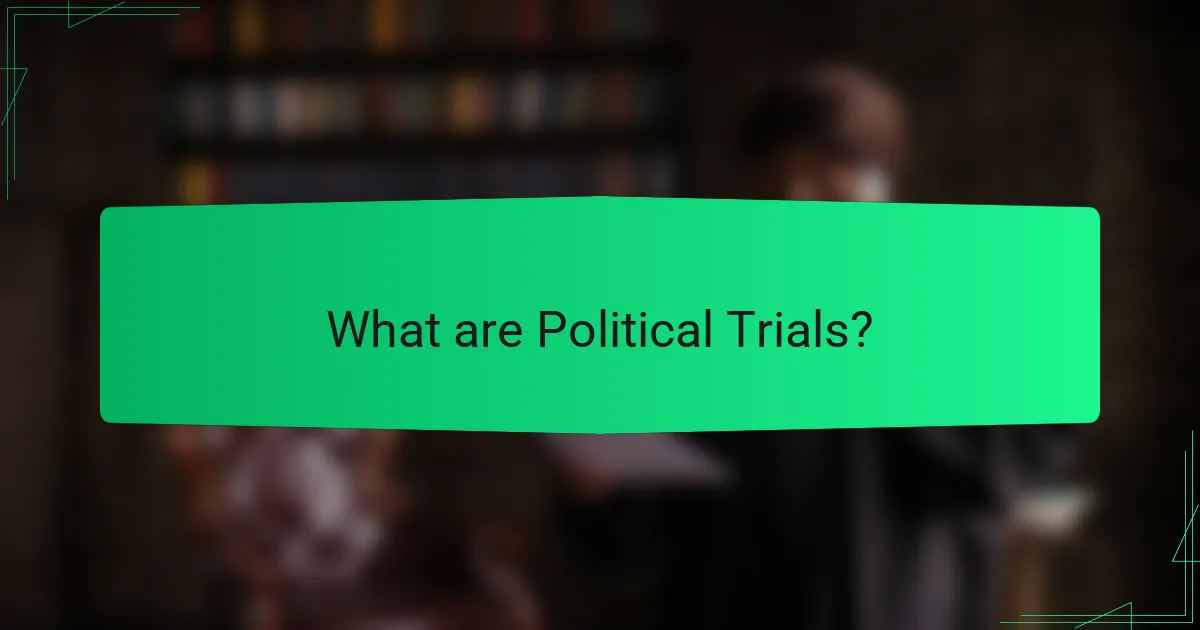
What are Political Trials?
Political trials are legal proceedings that involve defendants charged with crimes primarily motivated by political reasons. These trials often arise in contexts where the state seeks to suppress dissent or control political opposition. Historical examples include the trials of political dissidents in authoritarian regimes. Political trials can be characterized by a lack of impartiality in the judicial process. They frequently involve charges that may not align with traditional criminal offenses. The outcomes of such trials are often influenced by political agendas rather than legal merits. In many cases, political trials serve to legitimize government actions against perceived threats.
How do Political Trials differ from Regular Trials?
Political trials differ from regular trials primarily in their context and implications. Political trials often involve government officials or politically charged cases. They can be influenced by public opinion and political agendas. Regular trials typically focus on individual criminal or civil matters without broader political implications.
In political trials, the prosecution may pursue charges that serve political purposes. This can lead to selective enforcement of laws. Regular trials generally adhere strictly to legal standards and evidence without political motivations. Additionally, political trials may face heightened media scrutiny. This can affect the trial’s atmosphere and proceedings.
Historical examples include the impeachment trials of U.S. presidents, which illustrate political motivations. In contrast, regular trials, like those for theft or assault, follow established legal procedures. These distinctions highlight the unique nature of political trials compared to regular judicial processes.
What legal definitions apply to Political Trials?
Political trials are legal proceedings that involve individuals accused of politically motivated crimes. These trials often occur in contexts where the state seeks to suppress dissent or punish political opponents. Legal definitions applicable to political trials include concepts such as treason, sedition, and conspiracy against the state. Treason refers to acts that betray one’s country, typically requiring proof of intent to overthrow the government. Sedition involves inciting rebellion against authority, often linked to free speech issues. Conspiracy charges address agreements between individuals to commit unlawful acts against the state. Historical examples, such as the Nuremberg Trials, illustrate the application of these definitions in a political context.
What historical context shapes Political Trials?
Political trials are shaped by historical contexts that include regime changes, social movements, and legal precedents. Throughout history, political trials often arise during times of upheaval, such as revolutions or wars. For example, the Nuremberg Trials after World War II established legal accountability for war crimes. Additionally, the McCarthy era in the United States highlighted the impact of anti-communism on judicial processes. Political trials can also reflect societal tensions, such as civil rights movements challenging systemic injustices. Historical legal frameworks, like the establishment of habeas corpus, influence the conduct of political trials. Contextual factors such as public opinion, media coverage, and international relations further shape these trials.
Why are Political Trials significant in society?
Political trials are significant in society because they shape public discourse and influence political accountability. They often highlight issues of justice, governance, and human rights. Historical examples, such as the Nuremberg Trials, established precedents for international law and accountability. Political trials can mobilize public opinion and lead to social change. They also serve as a mechanism for addressing corruption and abuse of power. Furthermore, they can expose systemic issues within political systems. The outcomes of political trials can impact future legislation and policy-making. Overall, political trials play a crucial role in maintaining democratic values and fostering transparency.
How do Political Trials influence public opinion?
Political trials significantly influence public opinion by shaping perceptions of justice and accountability. Media coverage of these trials often highlights key events and testimonies. This coverage can sway public sentiment toward the accused or the prosecution. For example, high-profile political trials, such as that of former President Donald Trump, have led to polarized public views. Polls indicate that opinions on the trial’s fairness vary widely among political affiliations. Additionally, political trials can provoke public discourse about systemic issues, such as corruption or abuse of power. This discourse can mobilize citizens and affect voter behavior in subsequent elections. Historical examples, like the Watergate scandal, show how trials can alter political landscapes. Thus, political trials serve as a catalyst for public opinion formation.
What role do Political Trials play in democratic processes?
Political trials serve as a mechanism for accountability in democratic processes. They can expose corruption and abuse of power among public officials. Such trials can also reinforce the rule of law by demonstrating that no one is above the law. Additionally, they provide a platform for public discourse and scrutiny of governmental actions. Historical examples include the impeachment trials of U.S. Presidents, which highlight the checks and balances inherent in democracy. Political trials can mobilize public opinion, influencing future elections and policy decisions. They play a critical role in upholding democratic values and protecting civil liberties.
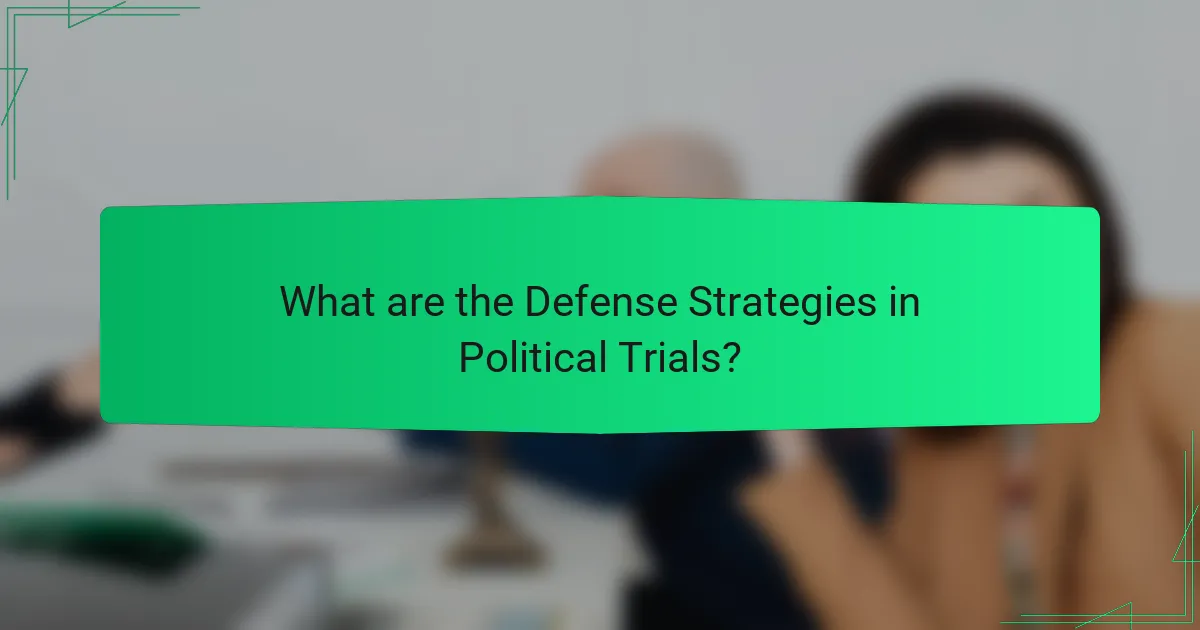
What are the Defense Strategies in Political Trials?
Defense strategies in political trials often include presenting alibis, challenging evidence, and utilizing public opinion. Alibis serve to establish the defendant’s absence from the crime scene. Challenging evidence involves questioning the credibility and reliability of witnesses or documents. Utilizing public opinion can sway the court’s perception of the defendant. Historical examples show that defense teams often emphasize political motivations behind charges. They may argue that the prosecution lacks impartiality. Additionally, invoking constitutional rights can be a key strategy. This includes asserting the right to free speech or protection against unjust prosecution. Each strategy aims to create reasonable doubt in the minds of jurors.
How do Defense Attorneys prepare for Political Trials?
Defense attorneys prepare for political trials by conducting thorough research and analysis of the case. They examine relevant laws, regulations, and precedents that may impact the trial. Attorneys also gather evidence and witness testimonies to support their defense strategy. They often engage in mock trials to test arguments and anticipate prosecution tactics.
Additionally, defense attorneys assess public opinion and media coverage, as these factors can influence the trial’s dynamics. They work closely with experts to provide insights into complex issues involved in the case. By developing a clear and compelling narrative, they aim to present their client’s position effectively.
Collaboration with the client is crucial to ensure that all aspects of the defense are aligned with the client’s best interests. This multifaceted approach helps defense attorneys prepare comprehensively for the unique challenges presented by political trials.
What evidence and arguments are typically used in defense?
Defense strategies in political trials often rely on evidence such as alibis, witness testimonies, and expert opinions. Alibis can demonstrate that the defendant was not present at the scene of the alleged crime. Witness testimonies can provide alternative accounts that challenge the prosecution’s narrative. Expert opinions can offer insights that question the validity of the evidence presented by the prosecution.
Additionally, defenses may argue procedural errors or violations of rights. For instance, a lack of due process can undermine the prosecution’s case. The defense might also highlight inconsistencies in witness statements to cast doubt on their credibility.
Historical examples show that these strategies can be effective. In the case of the Chicago Seven, the defense utilized extensive witness testimony to counter the prosecution’s claims. This approach led to significant challenges against the charges brought forward.
How do attorneys anticipate prosecution tactics?
Attorneys anticipate prosecution tactics by analyzing past cases and patterns of behavior. They study the prosecution’s history and strategies in similar cases. This includes reviewing case law and legal precedents that inform prosecutorial decisions. Attorneys also engage in pre-trial discovery to gather evidence and understand the prosecution’s position. They may consult with experts to gain insights into potential prosecution approaches. Additionally, attorneys leverage their courtroom experience to predict how prosecutors might react to various defense strategies. By staying informed about changes in law and prosecutorial trends, attorneys enhance their ability to anticipate tactics effectively.
What are common Defense Strategies employed?
Common defense strategies employed in political trials include challenging the prosecution’s evidence, asserting legal defenses, and presenting alternative narratives. Defendants often argue that the evidence is insufficient or improperly obtained. Legal defenses may include claims of self-defense or entrapment. Presenting alternative narratives involves framing the defendant’s actions in a more favorable light. These strategies aim to create reasonable doubt in the minds of jurors. Historical examples show that effective use of these strategies can lead to acquittals. In the case of the Watergate scandal, defendants successfully argued about the legality of evidence obtained against them.
How does the choice of strategy depend on the case specifics?
The choice of strategy in political trials depends on various case specifics. Factors include the nature of the charges, evidence available, and the political context. Defense strategies may vary based on whether the case involves corruption, dissent, or human rights violations. The prosecution’s approach is influenced by the strength of the evidence and public sentiment. For example, in high-profile cases, media coverage can sway public opinion, impacting courtroom dynamics. Additionally, the legal framework and jurisdictional differences play a crucial role in shaping strategies. Each case’s unique circumstances necessitate tailored approaches for effective advocacy or prosecution.
What role does public sentiment play in Defense Strategies?
Public sentiment significantly influences defense strategies in political trials. Defense teams often consider public opinion to shape their approach. Positive public sentiment can lead to more lenient treatment from juries. Conversely, negative sentiment may compel defense strategies to focus on mitigating damage. Historical cases illustrate this influence. For example, in the trial of O.J. Simpson, public sentiment played a crucial role in jury perceptions. Defense strategies were tailored to counteract media narratives and public bias. Understanding public sentiment enables defense teams to navigate courtroom dynamics effectively.
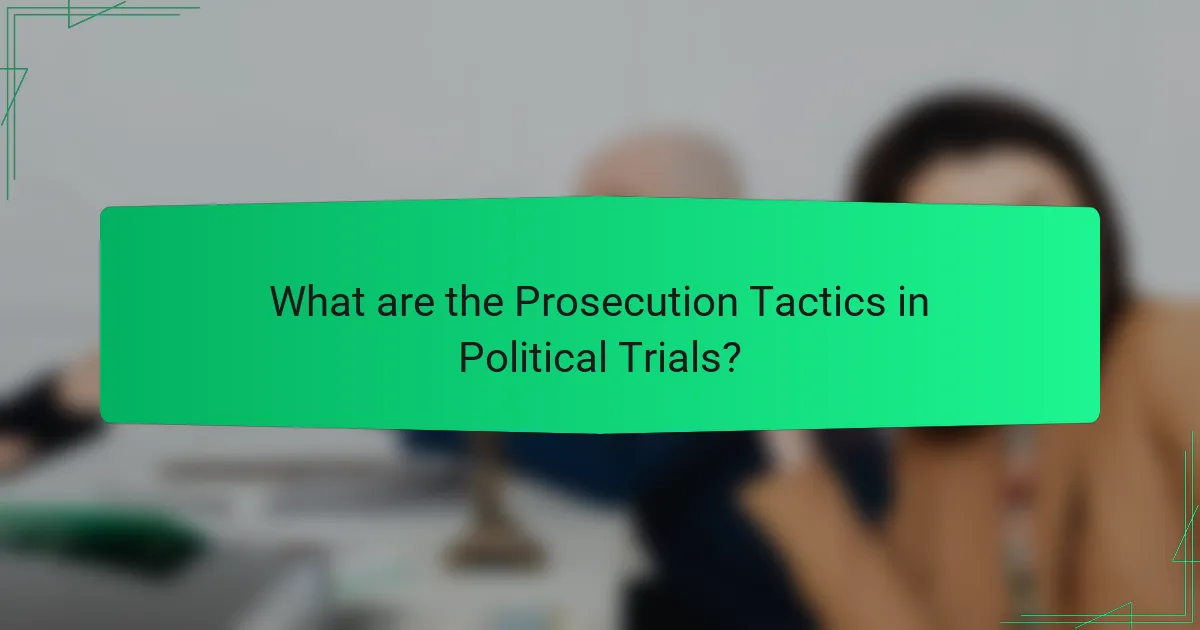
What are the Prosecution Tactics in Political Trials?
Prosecution tactics in political trials include the use of strategic evidence presentation, public opinion manipulation, and leveraging legal precedents. Prosecutors often present evidence that aligns with the political narrative they wish to promote. They may also engage in media campaigns to sway public perception in favor of their case. Additionally, they utilize established legal precedents to frame their arguments, making them more compelling in court. Historical examples show that prosecutors in political trials often aim to create a sense of urgency or threat surrounding the defendant’s actions. This can influence jury perceptions and lead to harsher outcomes. Overall, these tactics are designed to maximize the prosecution’s chances of securing a conviction in a politically charged environment.
How do Prosecutors build their case in Political Trials?
Prosecutors build their case in political trials by gathering evidence and establishing a legal framework. They begin by investigating allegations, which includes collecting documents, witness statements, and expert testimonies. They analyze the facts to identify relevant laws that apply to the case. Prosecutors often collaborate with law enforcement to ensure thorough investigations. They also assess the credibility of evidence and witnesses to strengthen their arguments. In political trials, they may focus on public interest and the implications of the case. They prepare legal briefs and present their findings to the court. This systematic approach helps establish a compelling case against the defendant.
What types of evidence are most effective for prosecution?
Direct evidence, such as eyewitness testimony, is most effective for prosecution. It provides firsthand accounts of the crime, establishing facts clearly. Physical evidence, like fingerprints or DNA, also plays a crucial role. This type of evidence can link a suspect directly to the crime scene. Documentary evidence, including emails or financial records, helps to establish motives or connections. Expert testimony can clarify complex evidence for the jury. Collectively, these types of evidence strengthen the prosecution’s case significantly. Statistics show that cases with strong evidence lead to higher conviction rates.
How do prosecutors handle political influence in their cases?
Prosecutors handle political influence in their cases by adhering to legal standards and ethical guidelines. They prioritize the rule of law over political pressures. Prosecutors often seek to maintain objectivity in their decisions. They may also consult with senior officials or ethics boards to navigate complex situations. Additionally, transparency in their actions can help mitigate concerns about political bias. Historical examples, such as the prosecution of political figures, illustrate the challenges they face. In these cases, prosecutors must balance public interest with legal integrity. This approach helps maintain public trust in the judicial system.
What challenges do Prosecutors face in Political Trials?
Prosecutors face various challenges in political trials. These challenges include political pressure that can influence case outcomes. Additionally, public scrutiny often complicates the prosecution process. The complexity of legal issues in political trials can also create difficulties. Prosecutors may deal with a lack of resources, impacting their ability to build strong cases. Furthermore, the potential for jury bias exists due to the high-profile nature of these cases. Finally, the interplay of law and politics can lead to unpredictable legal interpretations. These factors collectively hinder the effectiveness of prosecutors in political trials.
How do media and public scrutiny impact prosecution efforts?
Media and public scrutiny significantly impact prosecution efforts by influencing public perception and judicial processes. High-profile cases often attract extensive media coverage. This coverage can pressure prosecutors to pursue cases more aggressively. It can also lead to heightened expectations from the public for convictions. Additionally, media narratives can shape the courtroom dynamics. Prosecutors may feel compelled to present stronger evidence to counteract public skepticism. Studies show that media attention can affect jury selection and juror behavior. In some instances, it can lead to biased juries, complicating prosecution efforts. Overall, the interplay between media scrutiny and prosecution is complex and multifaceted.
What strategies do prosecutors use to counteract defense tactics?
Prosecutors use several strategies to counteract defense tactics. They often rely on thorough case preparation. This includes gathering strong evidence and witness testimonies. They aim to anticipate defense arguments. By understanding potential defenses, prosecutors can prepare rebuttals.
Prosecutors may also utilize expert witnesses. These experts help clarify complex issues for the jury. They can strengthen the prosecution’s case by providing credible information. Additionally, prosecutors may focus on jury selection. A favorable jury can influence the trial’s outcome.
Finally, they may employ persuasive closing arguments. These arguments summarize the evidence effectively. They aim to reinforce the prosecution’s narrative. By employing these strategies, prosecutors work to undermine defense tactics and strengthen their case.
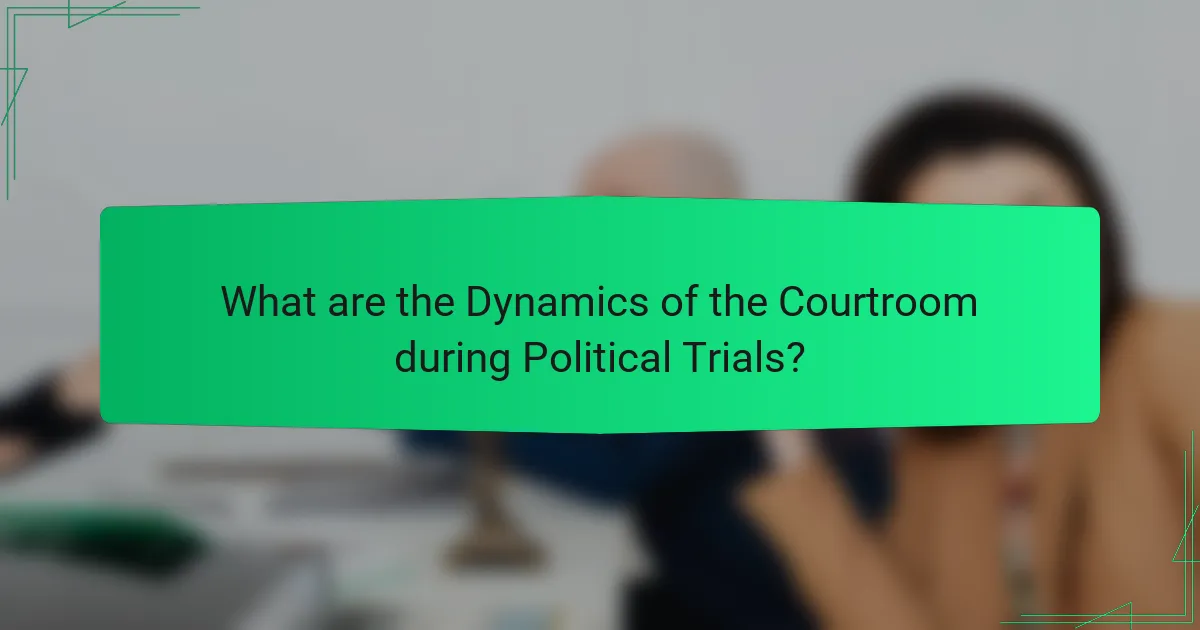
What are the Dynamics of the Courtroom during Political Trials?
The dynamics of the courtroom during political trials involve heightened scrutiny and intense public interest. These trials often feature a polarized atmosphere due to the political implications. Judges may face pressure from various stakeholders, including the media and political entities. The prosecution typically emphasizes the gravity of the charges, aiming to sway public opinion. Defense strategies often focus on undermining the credibility of the prosecution’s evidence. Witness testimonies can be particularly charged, reflecting the political stakes involved. Jury selection may be influenced by potential biases regarding the political context. Overall, courtroom dynamics in political trials are characterized by a complex interplay of legal strategies and public sentiment.
How does courtroom atmosphere affect the trial process?
Courtroom atmosphere significantly influences the trial process. A positive atmosphere can enhance juror engagement and decision-making. Conversely, a tense atmosphere may lead to biased judgments or emotional responses. Studies indicate that jurors are more likely to favor defendants in a calm environment. The presence of supportive family members can also create a more favorable atmosphere for the accused. Additionally, the demeanor of the judge and attorneys impacts courtroom dynamics. A respectful and orderly environment promotes fairness and impartiality. Overall, the courtroom atmosphere plays a crucial role in shaping trial outcomes.
What roles do judges and juries play in Political Trials?
Judges and juries play critical roles in political trials. Judges oversee the legal proceedings and ensure adherence to the law. They make rulings on admissibility of evidence and interpret legal standards. Judges also provide instructions to juries on legal principles relevant to the case. Juries, composed of citizens, evaluate the evidence presented. They determine the facts of the case and deliver verdicts based on their findings. The jury’s role is to represent the community’s perspective. In political trials, the jury’s impartiality is essential for a fair outcome. Historical examples show that jury decisions can significantly influence public perception of political issues.
How do courtroom dynamics change with high-profile cases?
Courtroom dynamics shift significantly in high-profile cases. Increased media attention alters how participants behave. Jurors may feel pressure from public opinion. Judges often implement stricter courtroom protocols to maintain order. The presence of cameras can change witness testimonies due to heightened scrutiny. Attorneys may adopt more aggressive strategies to sway public perception. High-profile cases can lead to longer trial durations due to extensive media coverage. Public interest can create a tense atmosphere, impacting jury deliberations. These factors collectively influence the overall trial process and outcomes.
What are the implications of courtroom dynamics on trial outcomes?
Courtroom dynamics significantly influence trial outcomes. The interactions between judges, juries, attorneys, and witnesses shape the perception of evidence and arguments. For instance, a judge’s demeanor can impact jury confidence. A calm and authoritative judge may foster respect for the legal process. Conversely, a contentious judge can create tension, affecting jury deliberations.
Additionally, the effectiveness of attorneys in presenting their cases relies on courtroom dynamics. Strong communication skills and the ability to engage the jury can sway opinions. Studies show that jurors often respond to non-verbal cues from attorneys. These cues can include body language and eye contact, which play a crucial role in persuasion.
Moreover, the composition of the jury and their backgrounds can also affect outcomes. Diverse juries may bring varied perspectives that influence deliberation. Research indicates that jurors’ personal experiences shape their interpretations of evidence. Thus, courtroom dynamics, including the interactions and characteristics of all participants, are critical in determining trial outcomes.
How do emotional appeals influence jury decisions?
Emotional appeals significantly influence jury decisions by impacting jurors’ perceptions and feelings. These appeals can evoke sympathy, anger, or fear, swaying jurors away from objective analysis. Research indicates that jurors are more likely to favor emotionally charged narratives over factual evidence. For instance, a study by Kovera and McAuliff (2000) demonstrated that jurors exposed to emotional testimonies were more likely to render verdicts aligned with the emotional tone of the evidence. This suggests that emotional appeals can create biases that affect the outcome of trials.
What strategies can be employed to manage courtroom dynamics?
Strategies to manage courtroom dynamics include establishing clear rules of conduct. Judges can enforce decorum to maintain order. Effective communication among parties ensures clarity and reduces misunderstandings. Active listening promotes respect and understanding in discussions. Nonverbal cues, such as body language, can influence courtroom interactions. Preparation and organization of evidence streamline proceedings and minimize disruptions. Engaging with jurors through relatable language fosters connection and comprehension. Utilizing technology can enhance presentations and keep the courtroom focused on the case.
What best practices should be followed in Political Trials?
Best practices in political trials include ensuring impartiality, maintaining transparency, and adhering strictly to legal standards. Impartiality is crucial to prevent bias in judicial proceedings. Transparency helps build public trust in the legal process. Legal standards must be followed to uphold the integrity of the trial. Additionally, effective communication among legal teams is essential for presenting clear arguments. The use of expert witnesses can provide credible testimony. Maintaining a fair and respectful courtroom atmosphere is vital for all parties involved. Lastly, thorough documentation of all proceedings enhances accountability and can serve as a reference for future cases.
Political trials are legal proceedings characterized by defendants charged with crimes driven by political motivations, often reflecting a lack of impartiality. This article delves into the distinct nature of political trials compared to regular trials, examining their legal definitions, historical contexts, and societal significance. It highlights the defense strategies employed by attorneys, the prosecution tactics used to build cases, and the dynamics within the courtroom that influence trial outcomes. Key aspects include the impact of public sentiment, media scrutiny, and courtroom atmosphere on both defense and prosecution efforts, as well as best practices for ensuring fairness and transparency in these politically charged legal environments.
